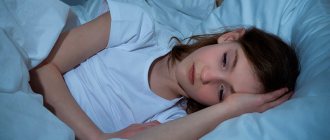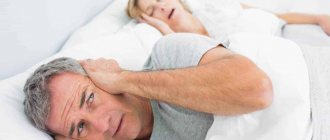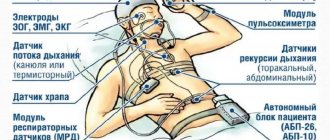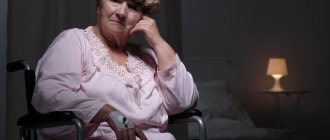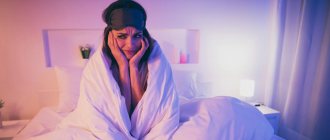Stress, urgent matters, the need to constantly be in touch, the nightlife of a big city - all these are modern realities and at the same time risk factors for the health of the human nervous system.
Once upon a time, our rhythm of life was completely tied to the annual and daily cycles, to the rising and setting of the sun, and when darkness fell, a person had no choice but to go to bed. Today society has the opportunity to function according to its own laws, ignoring and disrupting natural rhythms. However, no one has canceled our own internal biological rhythms. This leads to many problems. In first place is autonomic dysfunction of the nervous system and all accompanying symptoms, including insomnia as a result of disturbances in sleep and rest patterns.
Why do you experience disrupted sleep?
Disturbed sleep occurs for a variety of reasons. In most cases, sleep disorders are related to the way a person lives, their sleep and sleep patterns, and their health. The most common causes of sleep disturbance are related to disruptive behavior, the use of medications, and work habits. For example, sleep deprivation in people who work routinely leads to an increased risk of diabetes and vaginal problems.
Before signs and symptoms of sleep disturbance, pay attention to:
- extreme daytime sleepiness;
- irregular breathing;
- increased laxity during sleep;
- irregular cycle of sleep and lack of sleep;
- Difficulties due to blues.
The broadest types of sleep disturbance include:
- insomnia, for which it is important to fall asleep or fall asleep during the night after waking up;
- sleep apnea, when a person suffers from intermittent breathing, which is often accompanied by snoring;
- restless legs syndrome (RLS), which causes unpleasant sounds and twisted legs when trying to fall asleep;
- narcolepsy is a condition characterized by severe drowsiness and rough sleep throughout the day (for example, during the day).
For prompt treatment to the doctor, most sleep disorders should be rejoiced (for example, seizures if you are in a dream). Some people may not notice problems with sleep for a long time and give up, not caring about those who sleep much less, less necessary. After about an hour, women and men become restless, sometimes sleep deprived, and signs of insomnia (excessive or restless sleep) appear.
Symptoms of stress
Stress is manifested not only by emotional tension. With strong and frequent stressors, a decrease in memory and attention appears, and rapid fatigue is noted. A person experiences irritability, sleep disturbances, apathy, sometimes turning into depression.
Complaints of sleep disorders during stress include difficulty falling asleep, shortened sleep periods, frequent awakenings, shallow sleep, and lack of energy after rest. A typical sleep disorder under stress is the appearance of parasomnias: sleepwalking, nightmares, increased motor activity during sleep, confusion during night awakenings. Stress often causes the onset of various pain syndromes: tension headaches, migraine attacks.
Sleeplessness. Why should you be timid and fall asleep?
According to the American Academy of Medicine's ICSD-3 sleep survey, insomnia is identified as a persistent difficulty with sleep, difficulty or difficulty sleeping. Insomnia may have no potential factors and symptoms, and its diagnosis relies on two main components:
- sleep disturbances, which arise independently from the presence of sufficient capacity for normal sleep;
- daily disruptions are directly related to poor nutrition and poor sleep (stress, emotional outbursts).
A doctor can determine the causes and signs of sleep disturbance. Sleeplessness strikes:
- chronic, which is characterized by symptoms that occur at least three times a day, lasting at least three months;
- short-term, which is no less troubling, less than three months.
How to revel in sleeplessness? Due to insomnia, most diagnoses fall into two categories:
- difficulties due to sleep patterns such as these (most often it occurs in people whose daily rhythm of life is synchronized due to factors such as disrupted rhythms or an irregular work schedule);
- Difficulties with falling asleep after a person falls asleep unexpectedly and then wakes up (often occurs in older people, as well as in people who rely on alcohol, caffeine or YouTube before bedtime).
Many women and men experience a mixture of insomnia, which includes problems with both sleep and anxiety. People who suffer from chronic insomnia may experience symptoms of mixed insomnia. Over the years, the signs of sleeplessness may change.
Based on the diagnosis, the doctor selects treatment: taking medications, cognitive behavioral therapy, switching to a healthy way of living and eating habits.
People who suffer from insomnia need to:
- take a nap during the day, especially at the end of the day;
- Avoid drinking alcohol, caffeine and thyme sprouts in the evening;
- get used to the late intake of hedgehogs;
- go in for sports every day on a regular basis;
- Maintain a consistent sleep schedule that includes the same hour of sleep and wake-up every day.
Classification of sleep disorders
1. Insomnia is insomnia, a disturbance in the process of falling asleep and staying asleep.
- Psychological refers to a psychological state and can be situational (temporary) or permanent.
- As a result of taking alcohol or taking medications:
1. chronic alcoholism;
2. prolonged use of drugs that activate or depress the central nervous system;
3. withdrawal syndrome from sleeping pills, sedatives or other drugs;
- Resulting from a mental illness
- Appearing as a result of breathing disorder during sleep:
1. syndrome of decreased alveolar ventilation;
2. sleep apnea syndrome;
- As a result of restless legs syndrome or nocturnal myoclonus
- As a result of other pathological conditions
2. Hypersomnia, which is increased sleepiness
- Psychophysiological, which is associated with the psychological sphere, can be permanent or temporary
- As a result of taking alcohol or taking medications;
- As a result of mental illness;
- As a result of various breathing disorders during sleep;
- Narcolepsy
- As a result of other pathological conditions
3. Incorrect wakefulness and sleep patterns
- Temporary sleep disturbances associated with a sudden change in work schedule or time zone
- Systematic sleep disorders:
1. slow sleep syndrome
2. premature sleep syndrome
3. syndrome in which there is no 24-hour sleep-wake cycle
4. Parasomnia, which is characterized by impaired functioning of systems and organs associated with sleep or awakening:
- somnambulism;
- enuresis;
- night terrors;
- nocturnal epileptic seizures;
- other disorders
How to interpret a dream as a neurosis?
To resolve restless, anxious or intermittent sleep due to neurosis, it is necessary to contact a neurologist. Insomnia is often associated with neurosis as a result of a number of psychological disorders (apathy, depression, anxiety, psychological trauma). Renewal of the sleep regime for aphid neurosis is based on medicinal therapy, which is based on the use of narcotic and sedative drugs. Some patients may be prescribed tranquilizers.
Also, treating insomnia for neurosis involves combating stress and using psychotherapeutic methods (group or individual therapy). The patient needs to avoid strong psychological pressures and worries, control emotions, and avoid depression.
How to restore sleep during neurosis
Treatment for insomnia may include following general sleep hygiene recommendations as well as the use of medication. Along with taking sedatives, melatonin preparations can help adults adjust their work and rest schedule and restore sleep after stress.
Melatonin, synthesized by the human body, performs a number of important functions, for example:
- regulates daily biorhythms, psycho-emotional and cognitive spheres;
- stabilizes the functioning of the autonomic nervous system;
- adapts and protects the body from stress 5 (ts-10)
The drug VELSON® from the Petrovax Pharm company contains synthetic melatonin, similar in structure and functions to human melatonin. According to the instructions for medical use of the drug, VELSON®, by regulating circadian rhythms, helps to fall asleep faster, reduce the frequency of night awakenings, and increase the total duration of sleep.7
VELSON® does not accumulate in the body and does not cause dependence, addiction or withdrawal symptoms.
When planning to take the drug, consult your doctor and read the instructions for use of the drug.
What is more dangerous about chronic lack of sleep?
Periodic or persistent lack of sleep or disrupted sleep in children and adults threatens a host of health problems. Lack of sleep or insufficient sleep can lead to:
- low body resistance to respiratory illnesses;
- problems with the heart and vessels;
- disease of the thyroid gland and endocrine system;
- disruption of the exchange of speeches;
- decreased immunity.
The study concluded that those people who often do not sleep are more likely to experience depression, anxiety and paranoia, and those who do not sleep well.
Choose the optimal temperature
Body temperature drops outside and rises before waking up. Bedroom temperatures that are too low or too high can affect the quality of your sleep. It is believed that for optimal sleep, it is best to keep the room temperature between 18 and 24°C. It should be remembered that body temperature is affected not only by the temperature in the bedroom, but also by bed linen and pajamas.
It is believed that for a comfortable sleep, your room should be like a cave - it should be dark, quiet and cool. To do this, you can open the windows, turn down the heating if possible, or use, for example, a fan.
What helps calm the nervous system?
If insomnia is blamed on neurosis, stress and other pathologies, it is necessary to calm the nervous system using other means, such as medicine. You cannot take drugs or other drugs without a prescription without a prescription. Self-destruction leads to disgusting self-esteem, the development of new illnesses.
Why does sleeplessness of a stationary nature occur? There may be many reasons for this problem and it is better to seek help from a doctor. In certain situations, people need comprehensive attention from a neurologist and psychologist.
Symptoms of sleep disorders
Symptoms of sleep disorders can vary and depend on the type of disorder. However, regardless of sleep disturbance, in a short period of time it can lead to a change in a person’s emotional background, performance and attentiveness. School-age children have learning disabilities and are less able to assimilate new information. There are often cases when a patient comes to the doctor complaining of worsening health, without realizing that this is related to disturbed sleep.
Psychosomatic insomnia. Insomnia is situational when it lasts no more than three weeks. People who suffer from insomnia have trouble falling asleep, wake up frequently in the middle of the night, and have difficulty getting back to sleep. They are characterized by early morning awakening and feel a lack of sleep after sleep. Because of this, they experience irritability, emotional instability, and overwork. The situation is complicated by the patients’ constant worries about disturbed sleep and anxious anticipation of the night. The time they spend trying to fall asleep lasts twice as long for them. Situational insomnia is caused by a person’s emotional state under the influence of certain psychological phenomena. Often, after the effects of stressful conditions cease, sleep returns to normal. But in certain cases, difficulties falling asleep, as well as night wakefulness, become commonplace, and the fear of insomnia further worsens the situation, which leads to the formation of regular insomnia.
Insomnia resulting from the use of alcoholic beverages or medications. Long-term regular consumption of alcohol can lead to sleep disturbances. The REM sleep phase is shortened and the patient often wakes up in the middle of the night. Once alcohol intake is stopped, the problem usually disappears after two weeks.
Disturbed sleep may be a side effect of medications taken that excite the nervous system. Long-term use of sleeping pills and sedatives also leads to insomnia. Over time, the effect of the drug wanes, and increasing the dose leads to a short-term improvement in the situation. Due to disturbed sleep, aggravation is possible, despite increased doses. In such situations, systematic short-term awakenings are observed, and a clear boundary between sleep phases disappears.
When a mentally ill person has insomnia, he or she experiences a constant feeling of severe restlessness at night, fairly light and shallow sleep, frequent awakenings, daytime apathy, and fatigue.
Sleep apnea syndrome or sleep apnea is a short-term cessation of air flow into the upper respiratory tract that occurs during sleep. Such a pause in breathing is usually accompanied by snoring or restlessness. There are obstructive apneas, which begin as a result of the closure of the lumen of the upper respiratory canals during inspiration, and central apneas, related to deviations in the functioning of the respiratory center.
Insomnia during restless legs syndrome begins to develop as a result of a feeling that forms deep in the calf muscles, which requires movement of the legs. The urge to move your legs appears before bed and disappears when you start walking, but it may return later.
What vitamins are needed to heal the nervous system?
To improve the nervous system in case of sleep problems, the doctor selects vitamin complexes, which include minerals, microelements and macroelements. Group B vitamins have a beneficial effect on the nervous system, which immediately improves balance and metabolic processes in the body.
The choice of vitamins depends on the diagnosis made by the doctor. For example, disturbed sleep during periods of stress leads to the use of complexes that replace folic acid, vitamins B1, B6, B9, C, as well as minerals (potassium, magnesium, saliva). Because neurosis and insomnia during pregnancy are to blame, women are not recommended to engage in sexual activities. Depending on the diagnosis of pregnancy, it is important to select antidepressants that are gentle on the fetus.
The difficulty of taking vitamins should be discussed with a doctor, especially for people who have been diagnosed with problems with the nervous system, as well as those who have problems with stress and heart problems.
0
1
1
Stat rating:
5 out of 5 based on 2 ratings
Author: Karaban Victoria Sergievna
Physician-neurologist. First category. Work experience over 15 years.
How is early awakening treated?
Drug treatment is most often prescribed at the initial stage. If sleep disturbance manifests itself as an independent condition, then taking the drug for 5-7 days is sufficient.
Sleeping pills can only be used as a temporary measure. For a complete cure, work with the psyche and restoration of emotional balance is necessary. And if the cause of early awakenings is due to a somatic or neurological disease, then it is necessary to involve a therapist and neurologist in the examination and treatment.
Drugs
Today, drugs from the benzodiazepine group are most often prescribed to treat insomnia. If frequent awakenings at night continue to torment a person, then the choice of drug can be expanded. Antidepressants, anticonvulsants, and antipsychotics are prescribed.
It must be remembered that the use of tranquilizers for more than 10-14 days leads to the body becoming accustomed to them. Moreover, alcohol enhances the hypnotic effect of drugs in this group. Therefore, the intake of alcoholic beverages during treatment with psychotropic drugs should be completely excluded.
If early awakening from sleep is caused by general anxiety and manifests itself as symptoms of neurosis, psychotherapy is most important. It is aimed at relaxation and finding peace: autogenic training, hypnosis, bodily relaxation methods, music therapy and aromatherapy. Physiotherapy in the form of soothing baths, relaxing massage techniques and artificial sleep also leads to quick and long-lasting results.
The Preobrazhenie Clinic has all the necessary specialists, clinical equipment and laboratory examination methods. We have a large arsenal of medications, as well as methods of physiotherapy, reflexology and other additional modern technologies for treating the problem of early awakening and other sleep disorders. Here you can also get qualified help in several areas:
- diagnosis and treatment of depression, neuroses and other diseases of the higher nervous system;
- diagnosis and inpatient treatment of mental disorders;
- diagnosis and treatment of musculoskeletal disorders.
Move
We know that exercise improves microbiota composition, improves mood and helps maintain physical and mental health. But beyond that, research shows that exercise can have a positive effect on sleep.
How exercise improves microbiota
In particular, physical activity helps improve the quality and duration of sleep, and also helps with insomnia. It is best to exercise in the morning or afternoon so that by night the body is ready for a full night's sleep. You should avoid intense exercise two hours before bed. And before going to bed, you can do light stretching exercises.
Reduce exposure to blue light
Blue light that comes from gadgets can negatively affect the quality of your sleep. This is why the habits of scrolling your feed on social networks or watching TV series before bed are not the healthiest. Blue light affects natural circadian rhythms.
The easiest way to minimize the negative effects of blue light is to give up gadgets 1-2 hours before bed. An alternative could be a paper book, conversations with loved ones, or any hobby that does not require a phone or computer.




